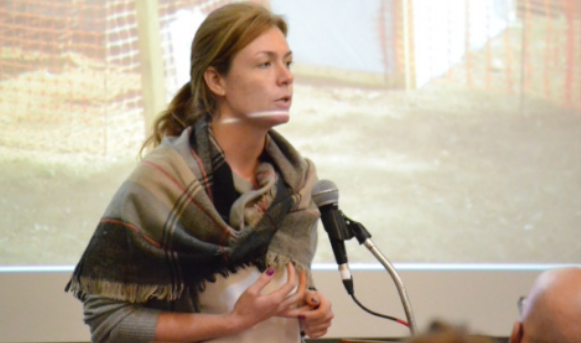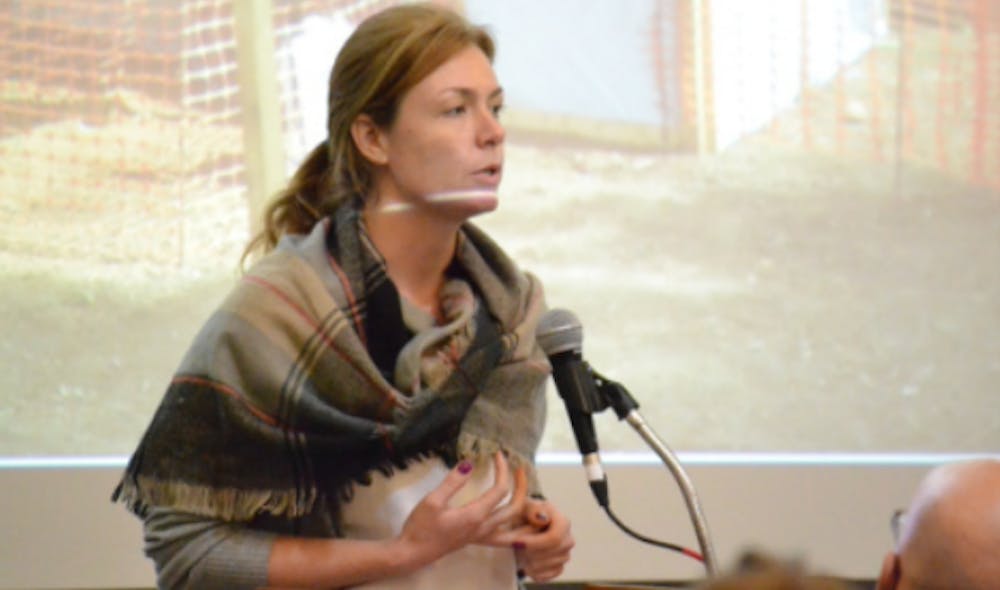By Tiffany Rutkowski
Correspondent
Ella Watson-Stryker, who was recognized as one of TIME magazine’s “Person of The Year” in 2014 for her role in combatting the West African Ebola outbreak, spoke to students at the College on Wednesday, Oct. 21, about the importance of public health promotion.
Antonino Scarpati, assistant dean of Student Services for the School of Nursing, Health and Exercise Science, welcomed Stryker, a health promoter, by acknowledging her heroism. Scarpati said millenials regard individuals such as celebrities as heroic, without enough recognition for people like Stryker.

Stryker’s lecture began with an image of a beach. Although many people think of disease, poverty and war when they think about Africa, this image was the view that Stryker had every day while heading to work.
Stryker began her work with Doctors Without Borders/Médecins Sans Frontières (MSF) in March 2014, when the Ebola outbreak called for a response team. She was asked to go to West Africa with a goal of stopping the virus and taking care of those who were already sick.
As a college student, Stryker was so interested in “everything” — what people thought and how they understood their place in world, according to Stryker. She was invested in people.
Stryker said she was told that Ebola is the worst mission that anyone could ever be sent on. There is no treatment, no cure and no vaccine. She was also told the mission would be a quick one.
“We had no way of knowing how wrong we were,” she said about the length of the mission. “I could tell this is not what I was briefed on.”
Nineteen months later, there was an underestimate of about 28,000 cases of Ebola and 11,000 deaths, according to Stryker.
Stryker said that when caring for West Africans, it was important to gain trust.
“I had to recruit staff who had high emotional intelligence,” Stryker said.
She told students that volunteers couldn’t shake hands, offer tea or ask how they were doing — all normal gestures for West Africans — because the patients were quarantined.
“It changes everything that is normal,” Stryker said.
Nicole Cancelliere, a freshman elementary education and sociology double major, said the facts presented in the lecture were surprising because while learning about the Ebola outbreak, people often don’t consider the villagers’ points of view or traditions that come with them.
view or traditions that come with them. The centers that were used to contain patients with the virus were built only for a temporary time and then burnt down afterwards to stop the spreading of Ebola, Stryker said. Hospitals in West Africa were not meant to contain viruses. Most of them didn’t even have running water, she said.
“It was really interesting hearing about these experiences from someone, themselves, versus reading it in a book,” said Jamie Pintimalli, a freshman elementary education and sociology double major.
Stryker said she was affected by this outbreak in a different way from other people.
“It arrived in a city that I had lived in,” Stryker said. “It killed people that were my friends.”
Ultimately, as a patient advocate, Stryker worked hard to meet victims’ social needs. Together, her team helped bridge the gap between the community and the responders, who were initially waved away by villagers with machetes.
“I think she’s an inspiration because of everything she’s gone through,” freshman international studies and marketing double major Surya Ramesh said. “In my eyes, she’s a hero.”
Before Stryker started her talk, Carole Kenner, the dean of the School of Nursing, Health and Exercise Science, announced that the program for a public health major was approved on Tuesday, Oct. 20, and will kickstart in 2016, along with a graduate certificate program.
“We’re so excited we’re going to launch these programs in ’16,” Kenner said.
Ruthann Russo, a visiting public health professor, shared a mutual excitement for the new program. Russo said the program has been in the process of being approved for a couple years. Now, there is a significant need for people in the field of public health, Russo said.







